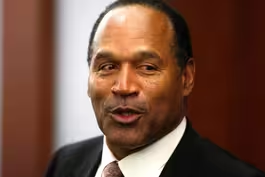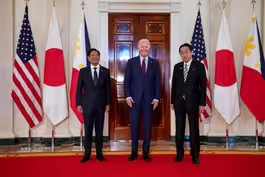
'Chili crunch' trademark sparks debate over food and culture
Clip: 4/11/2024 | 7m 15sVideo has Closed Captions
Celebrity chef's 'chili crunch' trademark sparks debate over food and culture
A hot debate over the ownership of a spicy Asian condiment has sent social media into a frenzy over food, culture, heritage and business. Momofuku founder David Chang is spearheading a trademark battle to protect its chili crunch brand. But the backlash against him has been swift. Stephanie Sy reports.
Problems playing video? | Closed Captioning Feedback
Problems playing video? | Closed Captioning Feedback
Major corporate funding for the PBS News Hour is provided by BDO, BNSF, Consumer Cellular, American Cruise Lines, and Raymond James. Funding for the PBS NewsHour Weekend is provided by...

'Chili crunch' trademark sparks debate over food and culture
Clip: 4/11/2024 | 7m 15sVideo has Closed Captions
A hot debate over the ownership of a spicy Asian condiment has sent social media into a frenzy over food, culture, heritage and business. Momofuku founder David Chang is spearheading a trademark battle to protect its chili crunch brand. But the backlash against him has been swift. Stephanie Sy reports.
Problems playing video? | Closed Captioning Feedback
How to Watch PBS News Hour
PBS News Hour is available to stream on pbs.org and the free PBS App, available on iPhone, Apple TV, Android TV, Android smartphones, Amazon Fire TV, Amazon Fire Tablet, Roku, Samsung Smart TV, and Vizio.
Providing Support for PBS.org
Learn Moreabout PBS online sponsorshipGEOFF BENNETT: A hot debate over the ownership of a spicy Asian condiment has sent social media a frenzy over food, culture, heritage and business.
We're talking about the trademark battle David Chang has been spearheading to protect his brand.
He's the celebrity chef and founder of the Momofuku restaurant group.
And the backlash against what many call a bullying tactic has been swift.
Stephanie Sy picks up the topic in a conversation recorded earlier.
STEPHANIE SY: Whatever you call it, chili crunch, chili crunch, this stuff has been a staple in a lot of Asian kitchens for generations, including my own.
David Chang's Momofuku Chili Crunch is a relatively new player introduced in store shelves just a few years ago.
However, his company acquired the trademark for the name chili crunch.
That means other brands that use chili crunch can be found liable for trademark violations.
And, in fact, some makers of chili crisp have received cease-and-desist letters.
For more on this sizzling topic, I'm joined by James Park, who's written a whole cookbook featuring chili crisp.
James, welcome to the "NewsHour."
I apologize in advance for all the puns that will inevitably come out in this conversation.
Describe the reaction you have been hearing to Momofuku's legal moves here.
Is it fair to say there's an uproar?
JAMES PARK, Author, "Chili Crisp: 50+ Recipes to Satisfy Your Spicy, Crunchy, Garlicky Cravings": Absolutely.
This has been quite a hot topic in the past few days and the backlash since the news broke has been quite intense.
And the community has been a little bit disappointed and also hurt by this action, because Momofuku has been a pioneer and a leader of this Asian food and products in the ever-growing chili crisp category and market.
And because he's going after smaller makers that are often operated by just one or a few people, they're calling him even a trademark bully because they're targeting a smaller people who don't have a capital or team to fight against this action.
STEPHANIE SY: And what impacts are the makers of chili crisp really worried about?
Are they worried Momofuku Chili Crunch will gain too much market share?
Are they worried they will actually be put out of business if they have to change their names or fight a legal fight?
JAMES PARK: Yes, I think it's a little bit of both.
I think they're worried about one particular brand might dominate -- dominate the market, because they have all the money and lawyer team to fight against.
But, also, I think the small makers are feeling a little bit discouraged and intimidated to go against a big company, because they don't know they will be the next target or they don't know their business will be out of the action.
And also they are worried about not having the creative freedom to describe a product that they are really excited.
And naming a product can be crucial for the marketing and the introduction to the category.
STEPHANIE SY: OK, for people who don't use chili crisp -- and you're the expert -- what's a Western equivalent that can illustrate what a pantry staple this is in Asian kitchens?
JAMES PARK: Yes, it's such an important pantry staple, especially in my kitchen and many Asian Americans.
Think of it more as a hot sauce and sriracha.
It's really, really versatile.
And even though it started as a condiment, just only as a finishing touch, they are used more nowadays as a part of cooking and marinating and seasoning.
And in my cookbook, there are so many recipes that are really changing the ideas of chili crisp can be so much more than just a finishing condiment.
And it's an easy way to add spice, flavors, and also textures that's different from hot sauces.
It's really, really unique and very important in many Asian culture and flavors.
STEPHANIE SY: And some might say it would be like trademarking mustard or ketchup.
But Momofuku, David Chang, they do own the trademark.
They have every right, one would say, to enforce their trademark, especially since larger companies like Trader Joe's have created a very similar condiment.
Why isn't David Chang given any allowance here by his critics?
JAMES PARK: Yes, I think it would have been a very different story if they went for much larger businesses.
But I think the reason why the company is getting so much of a bad backlash is because the community felt this level of betrayal from him and his company.
They were creating a path for other Asian entrepreneurs to create a product that's getting more popular.
And just seeing someone that has already created a path targeting their own community, rather than cultivating and try to uplifting this market, is feeling more of a negative and betrayal feeling.
STEPHANIE SY: Now, I did some research, and Chang's company did purchase the trademark rights from a Denver-based company called Chili Colonial, which already owned the name chili crunch.
Some might say at least now an Asian chef owns it.
Do you have any thoughts on that?
JAMES PARK: Yes, so I mean, chili crunch is also -- that brand is also started as a Mexican chili crisp which we call salsa macha.
And as you can see, it's not only just an Asian product.
It also exists in Mexican cuisine.
And it is just a -- it's just a -- it's another evidence that shows how universal this condiment is.
And it should never be really capitalized or dominated by one brand.
STEPHANIE SY: What does this food fight and the ability to trademark a phrase as general and multicultural, you say, as chili crunch portend for other corporate branding battles?
JAMES PARK: Yes, if a general descriptive term like this gets approved, it opens this dangerous Pandora's box of brands and people try to claim their, like, other cultural products.
Jing Gao, who is the CEO of Fly By Jing, recently withdrew their application to trademark their terms sichuan chili crisp because there has been enough awareness and cultural movement that are about creating that product.
And it is -- it doesn't have to work as a way to protect the term.
And I know that, based on this, other terms like Italian chili crisp is also pending for trademark.
And if this action gets approved, who knows whether there will be other fight for Korean chili crisp or Filipino chili crisp, and something that should be used to celebrate the culture is just turning into a battle of who can acquire a term that's going to make more money.
And it's just not a way to celebrate this original marginalized community product that people are creating for passion and their love.
STEPHANIE SY: James Park, author of the cookbook "Chili Crisp," thank you so much for joining us.
JAMES PARK: Thank you for having me.
Biden to close 'gun show loophole,' expand background checks
Video has Closed Captions
Clip: 4/11/2024 | 7m 5s | Biden moves to close 'gun show loophole' and expand background checks for gun buyers (7m 5s)
How Simpson's murder trial exposed a stark racial fissure
Video has Closed Captions
Clip: 4/11/2024 | 9m 22s | How O.J. Simpson's murder trial exposed a stark racial fissure in America (9m 22s)
Right-wing Republicans block reauthorization of FISA
Video has Closed Captions
Clip: 4/11/2024 | 6m 35s | Why right-wing Republicans are blocking the reauthorization of FISA (6m 35s)
U.S. bolsters Asian military ties amid Chinese provocations
Video has Closed Captions
Clip: 4/11/2024 | 8m 59s | U.S. bolsters military ties with Japan and Philippines amid Chinese provocations (8m 59s)
Wind-assisted vessels could make shipping climate-friendly
Video has Closed Captions
Clip: 4/11/2024 | 7m 20s | Wind-assisted vessels could make commercial shipping climate-friendly (7m 20s)
Providing Support for PBS.org
Learn Moreabout PBS online sponsorship
- News and Public Affairs

FRONTLINE is investigative journalism that questions, explains and changes our world.

- News and Public Affairs

Amanpour and Company features conversations with leaders and decision makers.












Support for PBS provided by:
Major corporate funding for the PBS News Hour is provided by BDO, BNSF, Consumer Cellular, American Cruise Lines, and Raymond James. Funding for the PBS NewsHour Weekend is provided by...




